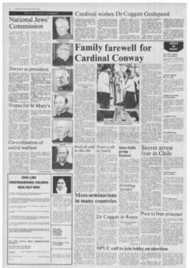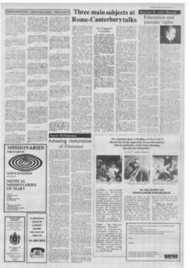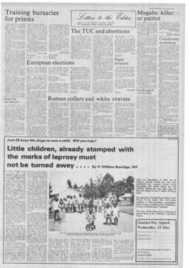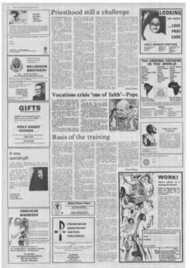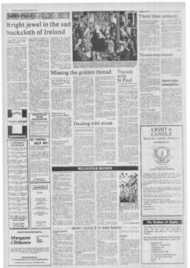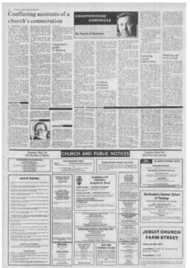Page 3, 29th April 1977
Page 3

Report an error
Noticed an error on this page?If you've noticed an error in this article please click here to report it.
Tags
Share
Related articles
Coggan To Visit Pope
Cardinal Wishes Dr Coggan Godspeed
Topic Of Women Priests Avoided In Rome Talks
Pope And Primate To Make Joint Statement
Dr Coggan Speaks On Ecumenism
Three main subjects at Rome-Canterbury talks
WHEN Archbishop Donald Coggan of Canterbury met Pope Paul this week he was the third successive Anglican Primate to visit the Bishop of Rome.
There was no agenda, strictly speaking, for the meeting. But three subjects from the vastly increased Anglican-Roman Catholic dialogue over the past decade are almost certain to have been discussed.
First is the question, already raised in correspondence between the Pope and Archbishop Coggan released last July, of how the decision to ordain women priests taken by several Anglican (Episcopal) Churches, notably those of the United States and Canada, will affect relations generally between Anglicans and Catholics.
The Pope's attitude as expressed in these letters was that the Anglican decision "cannot fail to introduce ... an element of grave difficulty" into the dialogue between the two Churches. He called the decision "so grave a new obstacle and threat" on the path of reconciliation.
It is an attitude since reinforced by the Vatican's Doctrinal Congregation, which in January issued a statement, with Pope Paul's approval, rejecting the ordination of women to the priesthood.
But Archbishop Coggan will be able to point out that the basic question is how Churches which ordain women and Churches which do.not can live in communion with each other or enter into communion with each other.
This is not a question which neatly divides Anglicans from Catholics, but one which has had to be faced within the Anglican Communion itself.
Sonic Anglican Churches notably the Church of England — seem unlikely to ordain women priests in the immediately foreseeable future or to allow women priests ordained elsewhere to officiate in public in their churches.
A second major item facing Rome and Canterbury is the almost incredible advance in doctrinal agreement recorded by the Anglican-Roman Catholic International Commission (ARCIC) in its three Agreed Statements: on the Eucharist (1971), on Ministry and Ordination (1973), and on Authority (1977).
Iwo questions arise here:
Dr Coggan's timetable
The Anglican Primate flew from London on Wednesday to Rome, where he has been staying at the English College. He met Pope Paul yesterday morning and in the afternoon he and Cardinal Jan Willebrands, president of the Vatican's Secretariat for Promoting Christian Unity, presided at the blessing of new bronze doors at the Church of St Paul's within the walls — the gift of the American Episcopalian Church. Archbishop Coggan preached.
Today the Pope and Archbishop Coggan were taking part in a service in the Sistine Chapel, after which they were expected to issue a common declaration. Archbishop Coggan gave a Press conference at noon at the English College.
Tomorrow, the Archbishop will fly to Istanbul to meet Patriarch Demetrios. Another meeting on Sunday will be followed by a joint declaration. Also on Sunday Dr Coggan will meet the Armenian Patriarch, Schnork Kaloustian, in Istanbul.
On Monday he will fly to Geneva, where he will meet senior World Council of Churches staff. Ile will attend a service in Geneva Cathedral on Tuesday and attend a civic reception before flying back to London.
first, to what extent do these statements reflect the attitudes of ordinary members of both Churches and to what extent are they endorsed by them and by their leaders'? Second, assuming that the international commission has succeeded in expressing the common faith of both Churches, what practical consequences need to be drawn about closer co-operation?
Beyond that lies what might be termed the unfinished business of the Statement on Authority — the questions concerning mainly the role of the papacy itself which still divide the two Churches. Needing to be discussed is what further action should be taken to see if this gap also can be bridged.
Third comes the final report of a separate Anglican-Rome Catholic international consultation on the theology of marriage. This underlined how very much the two
Churches have in common on this practical question and pointed to some degree of convergence in the delicate area of how each Church copes with the problem of broken marriages against a background of both Churches' public witness that marriage is indissoluble.
This commission
recommended that all marriages involving a Catholic which arc solemnised before an Anglican minister should be regarded as valid — in other words, that the Catholic requirement of the proper canonical form should he extended in include the Anglican marriage service. This is a practical proposal that probably every Anglican --and many Catholics — would like to see implemented.
In addition, officials on both sides can be assumed to be at work on drafting a suitable text for a joint statement, to he issued perhaps just after Archbishop Coggan is received in private audience by the Pope today.
Such a text might do no more than survey the admittedly substantial achievements of the II years since Archbishop Coggan's predecessor, Archbishop Michael Ramsey, visited the Pope in March, 1966,
It was Archbishop Geoffrey Fisher and Pope John XXIII who broke the ice in 1960.
The series of visits seems to be sufficient to suggest that most probably the next Archbishop of Canterbury Archbishop Coggan will reach the recommended retiring age of 70 in 1979 — will also go to Rome to pay a courtesy call on the Pope.
This would symbolise the way in which — however many and serious are the reservations Anglicans have about the power of the Pope, and however important are their objections to the way it is exercised Anglicans are to a considerable extent prepared to recognise in the Bishop of Rome a primacy of honour, and they find it difficult to envisage a reunited Church of the future which does not have a place for the Pope.
But it remains to be seen whether anything more will emerge from the meeting than making it easier for the next Archbishop of Canterbury to visit Rome — and perhaps making it more difficult for him not to.
blog comments powered by Disqus

